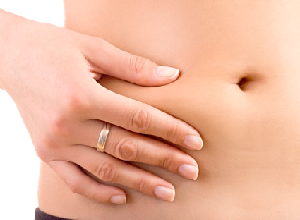Best Ways To Beat Belly Fat
If you are worried about belly fat, then some of these ideas might help you.

It is unfortunate that Menopause often means an increase in the amount of belly fat, and although you may only have put on a few pounds this is most likely where it will be found.
Like many other menopausal symptoms, hormone balance can be behind this as it is excess oestrogen that is often linked to belly fat. When the body shift production of oestrogen from the ovaries it unfortunately starts to make it in the fat cells of the abdomen, hips and thighs, just where we don’t want it.
If this is something you are struggling with, then perhaps some of these ideas might be helpful.
Increase fibre
Fibre has many sources, and although we tend to think of prunes they are not the best source. Leafy greens, whole grains, nuts, and beans are all good for keeping away the fat that stays deep in your belly.
That’s visceral fat, and it’s the most dangerous kind because it can wrap around major organs, including your liver, pancreas, and kidneys so it is a very good idea to tackle it sooner rather than later.
What won’t work
Although it is very tempting, there are no super foods that burn off visceral fat and however long you are in the gym you can’t tone it away with specific moves like crunches.
Instead, look for ways to upgrade your eating habits and add activity every day. Think about your average week and where migh yout be able to make some healthy changes?
What will work
While anyone can have too much visceral fat, it’s more likely if you’ve got a lot of weight to lose so addressing your diet is crucial.
As you start to take those pounds off, it will help your whole body, including belly fat that’s hidden out of your sight.
Choose fats wisely
What is important is that you do not give up fat altogether, as it is essential for so many parts of your body, including your brain function.
Fat is a source of essential fatty acids, which the body cannot make itself and helps the body absorb vitamin A, vitamin D and vitamin E.
These vitamins are fat-soluble, which means they can only be absorbed with the help of fats and if you don’t get enough fat in your diet, you may notice symptoms such as dry rashes, hair loss, a weaker immune system, and issues related to vitamin deficiencies.
To help maintain good health, most of the fats you eat should be monounsaturated or polyunsaturated fats so first limit the saturated kind that’s in animal foods, coconut and palm oils, and full-fat dairy by keeping portions of those foods smaller than you might normally do.
Next, check nutrition labels to see how many calories and how much fat is in a serving. Look for fats that are better for you, too, like those from plant foods or fish such as salmon, tuna, and mackerel that are rich in omega-3s.
Exercise effectively
It’s no good trying to burn off belly fat by exercising for hour after hour if that’s been what you have tried before.
Research shows that a few quick bursts of high-intensity exercise — such as a 30-second sprint — may be more effective, and easier to fit into your schedule.
You can add bursts of higher intensity to any workout by speeding it up or working harder for a brief time, then dropping back to a more mellow pace, and repeating.
Personally I don’t find gym workouts helpful but prefer one of the many ‘dance-based’ workouts online. Good music and there are so many to choose from you can do a different one every day of the week to stop boredom setting in.
Sleep and weight gain
When it comes to weight gain, sleep is a bit like Goldilocks porridge: too little — less than 5 hours — may mean more belly fat. But too much — more than 8 hours — can do that, too.
‘Just right’ seems to be around 6-8 hours and if you don’t sleep that much now, and at menopause many of us don’t due to hot flushes or bladder issues, look for ways to improve it.
Basic sleep hygiene means trying to keep a regular time to sleep, keeping your bedroom cool, don’t eat less than 2 hours before bed and don’t watch TV, text or email right before you turn in.
Although sleeping pills are available from your Doctor they should be taken on an ‘as needed’ basis and, if possible, not scheduled nightly and not for longer than two weeks at the most as they’re meant to help you reestablish a normal sleep pattern.
You could first try a more natural approach first such as Wellsprings Sleep Capsules which are a blend of amino acids and herbs known to promote sleep.
Forget a ‘quick fix’
Tempting though it may be, especially if you have a big event coming up such as a holiday or family wedding, a quick fix really does not help particularly if you’re thinking of cosmetic surgery.
Liposuction doesn’t reach inside the abdominal wall so it can’t get rid of visceral belly fat. Likewise, crash diets aren’t the solution, either as you’re too likely to go off them and the weight – and belly fat – soon comes back.
The slower, steadier option — lifestyle changes that you can commit to for a long time — really is the best bet.
Keep calm
Are you stressed out? That can make you eat more of the ‘comfort foods’ that tend to be high in fat and sugar. These unleash the stress hormone cortisol, which can boost belly fat.
Stress also can affect your hormone balance, make you sleep less, exercise less, and drink more alcohol — which can add belly fat, too.
It’s a great reason to take up meditation, work out, listen to music you love, and connect with a new hobby or make time to be with friends so you have some healthy ways to unwind and relax.
Rethink your fluids
Whether it’s a latte, a regular soft drink, a glass of beer, or wine, it’s got calories. An unfortunate effect of alcohol means you get so relaxed you may throw your willpower out the window and so you order your favourite high calorie meal, too.
So go for a smaller amount or alcohol, or switch to non calorie drinks like water – add a dash of fruit juice or vanilla extract to increase the flavour.
Don’t smoke
You may not be aware of it, but smoking makes you more likely to store fat in your belly, rather than your hips and thighs.
Plus the fact that it is linked to a number of diseases such as diabetes, cancer, heart and lung disease.
If you have tried before, and had difficulty, then get help either from your doctor or the many resources available that can support you while you quit.
Waist size, not clothes size
Most women are only too aware that clothes size can vary hugely from one company to another so relying on that as a guide to your weight is really not a good one.
A better method is to measure your waist and if you’re a woman, you want that number to be 35 inches or less. That’s important because you may lower your chance of having a heart attack, a stroke, or possibly certain types of cancer.
A tape measure can’t check on visceral fat, but along with the scale, it can help you track your weight loss.
Helpful information:
There are many aspects of menopause that cause women concern, and certainly weight gain is one of the greatest.
Hormone balance really is critical at this time and because such weight gain that occurs around the middle it is usually related to excess oestrogen, oestrogen dominance, so rebalancing with bioidentical progesterone is certainly a good first step.
If you want help with a specific diet that tackles oestrogen dominance, then this is the one for you.
https://anna.blog.wellsprings-health.com/the-diet-to-help-beat-oestrogen-dominance/



















